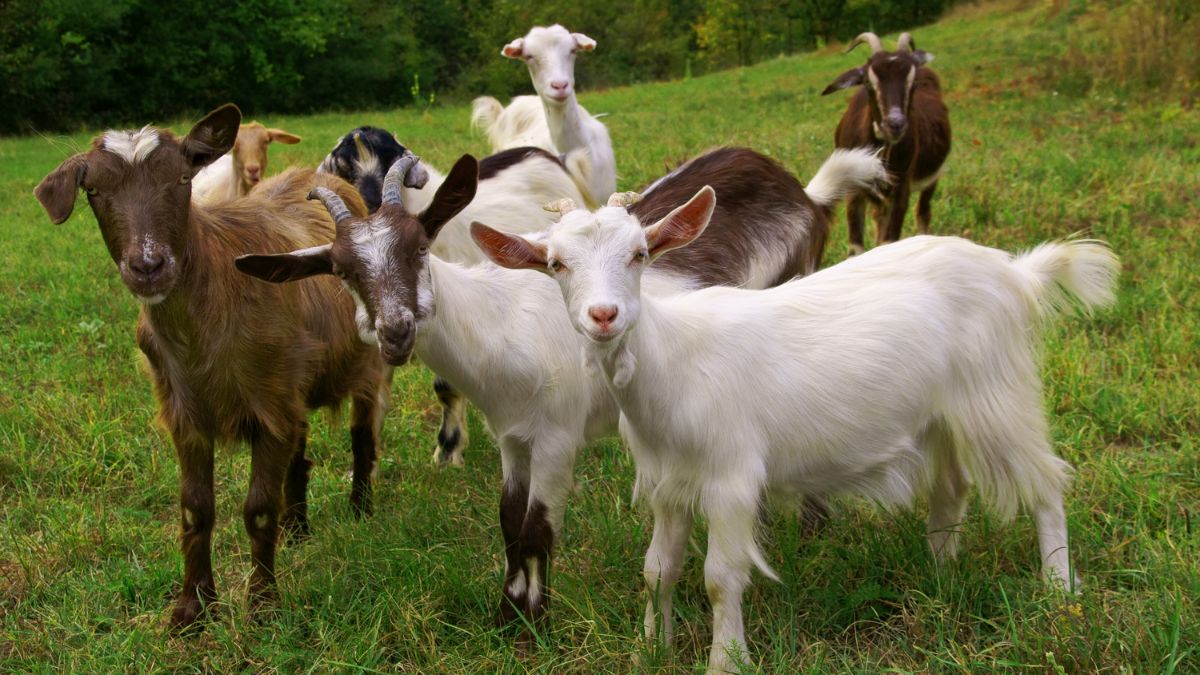Can Goats Eat Bananas? Is It Safe for Them?

Goats are notorious for their curious appetites, often found nibbling on an array of items that might surprise the average person. Among the myriad of foods, bananas are one of the treats that many goat owners wonder about. Are these sweet, yellow fruits safe for our caprine friends, or should they be kept out of reach?
The Nutritional Profile of Bananas: What’s Inside?
Bananas, loved for their natural sweetness and soft texture, are a staple in many human diets. They aren’t just delicious; they pack a nutritional punch as well. Rich in essential vitamins, minerals, and dietary fiber, bananas offer a range of health benefits. But what exactly is inside these crescent-shaped fruits that might be of interest to our goats?
Below is a nutritional table for a medium-sized banana (about 118 grams):
| Nutrient | Amount | Benefit |
|---|---|---|
| Calories | 105 | Energy source |
| Carbohydrates | 27g | Provides energy |
| Dietary Fiber | 3.1g | Aids in digestion |
| Sugars | 14g | Quick energy source |
| Protein | 1.3g | Essential for tissue repair and growth |
| Vitamin C | 10.3mg | Immune support and antioxidant |
| Vitamin B6 | 0.4mg | Important for brain health and function |
| Potassium | 422mg | Helps in muscle contraction and heart function |
| Magnesium | 32mg | Supports bone health and energy production |
| Folate | 24µg | Vital for cell division and synthesis of amino acids |
Given this nutritional breakdown, it’s clear that bananas offer various essential nutrients. However, when considering offering them to goats, it’s also essential to understand the specific needs and limitations of a goat’s digestive system.
Potential Benefits of Bananas for Goats
Offering bananas to goats can seem like a whimsical treat, but there’s more to it than just the joy of watching them nibble. When fed in moderation, bananas can provide a range of benefits for these ruminants:
Rich Energy Source: Bananas are a good source of carbohydrates, which can be a quick energy source for goats. This can be particularly useful during colder months when extra energy is required to maintain body temperature or for lactating does that have increased energy demands.
Digestive Health: The dietary fiber in bananas can aid in digestion. Fiber helps to regulate the digestive process, ensuring smooth bowel movements and preventing issues like constipation.
Essential Vitamins and Minerals: As a source of vitamins like Vitamin C, Vitamin B6, and minerals like potassium and magnesium, bananas can help in supplementing a goat’s diet. For instance, potassium is essential for muscle function, nerve function, and maintaining fluid balance.
Natural Antioxidants: Bananas, being a good source of Vitamin C, play a role as antioxidants. Antioxidants help in neutralizing free radicals in the body, which can reduce the risk of chronic diseases and boost overall health.
Tasty Treat and Training Aid: Beyond the nutritional benefits, bananas can be a delicious treat for goats. Their natural sweetness can make them an excellent choice for training rewards or to administer medicines that goats might otherwise be hesitant to consume.
Hydration Support: While not a primary source of hydration, the moisture content in bananas can contribute to the overall fluid intake, especially in situations where a goat might be reluctant to drink water.
While bananas should not constitute a significant portion of a goat’s diet, they can be a valuable supplementary treat. However, like with all treats, moderation is key, and it’s essential to watch for any adverse reactions when introducing them into a goat’s diet.
Risks and Concerns: Are All Parts of the Banana Safe?
While bananas can be a delightful treat for goats, it’s essential to approach them with caution and knowledge. Not every part of the banana is suitable for consumption, and even the edible parts can pose risks if given in excess. Here’s what goat owners should be aware of:
Peels and Pesticides: One of the significant concerns with banana peels is the potential presence of pesticides. Unless you’re certain that the bananas are organic and pesticide-free, it’s a safer bet to remove the peel before offering the fruit to your goat. If you do opt to feed the peel, ensure it’s thoroughly washed.
Overconsumption: Like any treat, bananas should be given in moderation. Overfeeding can lead to digestive issues in goats, including diarrhea or bloating. Excessive sugar intake from too many bananas can also disturb the natural balance of bacteria in a goat’s rumen.
Potential for Choking: While this is rare, larger pieces of banana can pose a choking hazard. To avoid this risk, it’s advisable to cut the banana into smaller, manageable pieces, especially when introducing it for the first time.
Disruption of Balanced Diet: Regularly feeding bananas in high quantities might deter goats from consuming their regular diet, which can lead to nutrient deficiencies over time.
Allergies or Sensitivities: While uncommon, some goats might have sensitivities or allergies to certain foods. Always observe your goat after introducing a new treat to its diet. Signs of an allergic reaction can include itching, hives, swelling, or difficulty breathing. If you notice any of these symptoms, consult with a veterinarian immediately.
Unripe Bananas: Green, unripe bananas contain more starch, which can be harder for goats to digest. It’s best to offer ripe bananas to ensure ease of digestion.
While bananas can be a great treat for goats, it’s crucial to approach their introduction with care. By being aware of the potential risks and monitoring your goat’s reactions, you can ensure that this tasty treat remains a healthy addition to their diet.
How to Introduce Bananas to a Goat’s Diet
Introducing bananas to a goat’s diet should be approached with care. Start by offering a small piece of banana to gauge your goat’s interest. This initial introduction will allow them to get accustomed to the taste and also enable you to observe for any immediate adverse reactions.
It’s advisable to peel the banana before feeding, especially if you’re unsure about pesticide residues on the peel. If you’re confident about the source and the bananas are organic, washing the peel thoroughly should suffice. Regardless, cutting the banana into smaller, manageable chunks is recommended. This ensures that the pieces are easy for your goat to chew and swallow, minimizing potential choking hazards.
After the initial introduction, it’s crucial to monitor your goat. Keep an eye out for signs of digestive distress such as bloating or diarrhea. Observing your goat’s behavior after introducing a new food is essential to ensure they’re tolerating it well. If any unusual behaviors or symptoms arise, it’s best to discontinue the banana treats and seek advice from a veterinarian.
Other Fruits and Treats: Safe Alternatives for Goats
Goats are often curious eaters, and their willingness to sample various foods can make them delightful creatures to interact with. While bananas are a viable treat, there are several other fruits and goodies that are safe for goats and can be added to their diet in moderation. Here’s a closer look at some of these alternatives:
- Apples: A favorite among many goats, apples are a crunchy treat packed with vitamins. Just be sure to remove the seeds, as they contain cyanogenic glycosides which can be harmful in large quantities.
- Pears: Similar to apples, pears are another sweet treat that goats enjoy. Remember to remove the seeds before feeding.
- Watermelon: This juicy fruit, including its rind, can be a refreshing snack, especially during warmer months. It’s hydrating and is often relished by goats.
- Grapes: These small fruits are often well-received by goats. Both red and green grapes are safe, but as with other treats, they should be given in moderation.
- Berries: Strawberries, blueberries, raspberries, and blackberries are all suitable for goats. They’re rich in antioxidants and vitamins.
- Carrots: While not a fruit, carrots are a crunchy treat that many goats love. They provide essential vitamins and can be given raw or slightly steamed.
- Leafy Greens: Spinach, kale, and lettuce are nutrient-rich additions to a goat’s diet. However, spinach should be given in moderation due to its oxalic acid content.
While all these fruits and treats can be healthy in moderation, it’s vital to ensure they don’t make up a significant portion of a goat’s diet. Their primary diet should still consist of quality hay, grains, and fresh water. Always introduce new foods gradually and observe for any changes in behavior or digestive upsets. If uncertain about any treat, it’s best to consult with a veterinarian or an expert in goat care.

